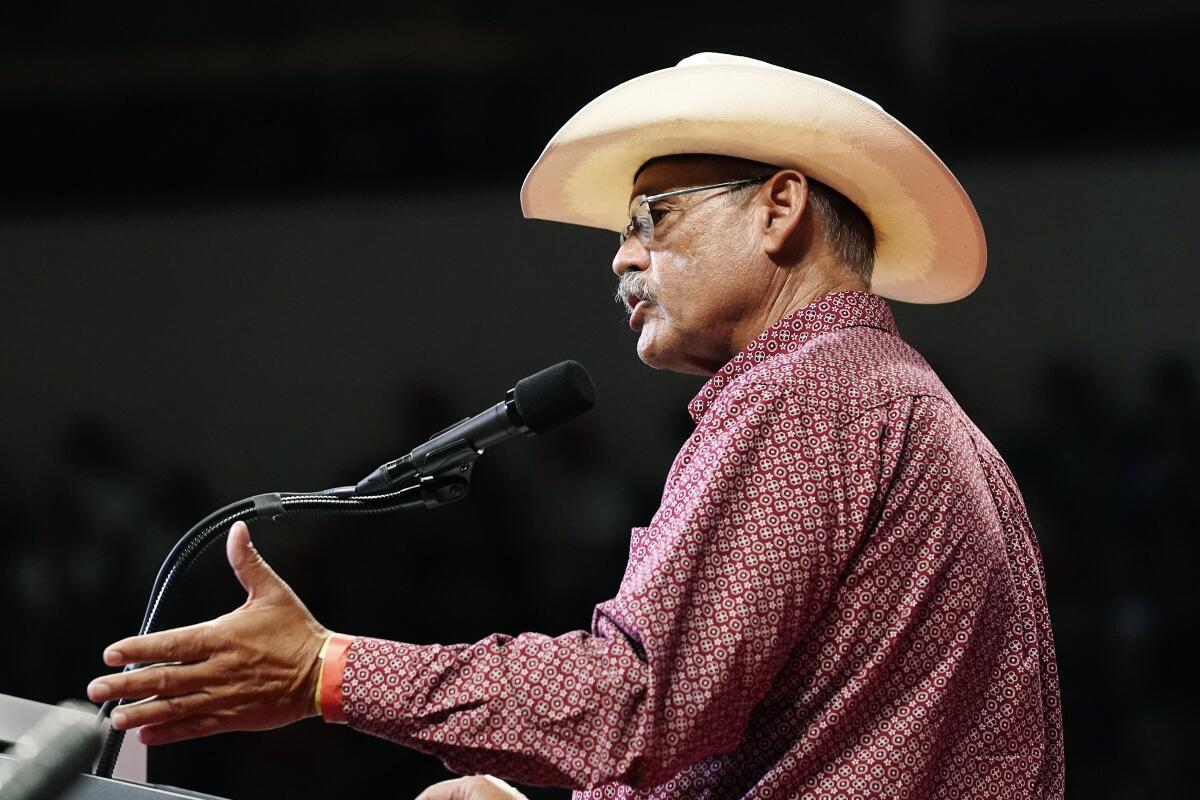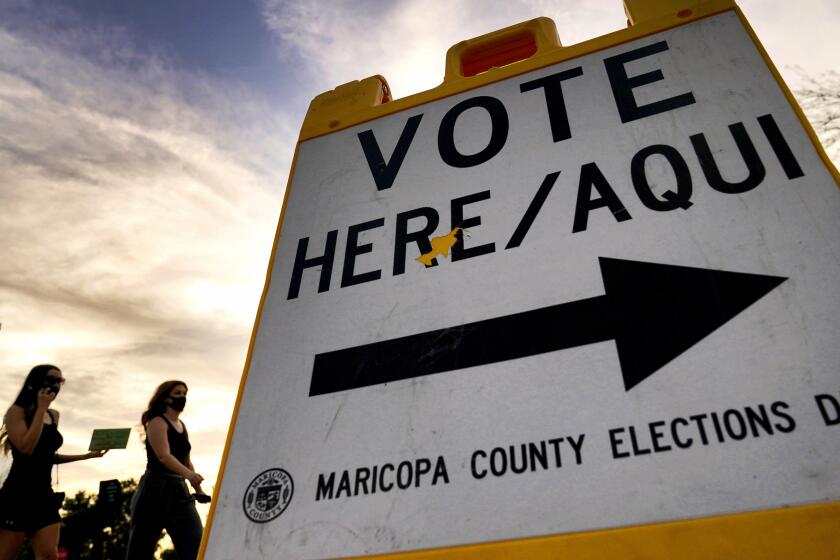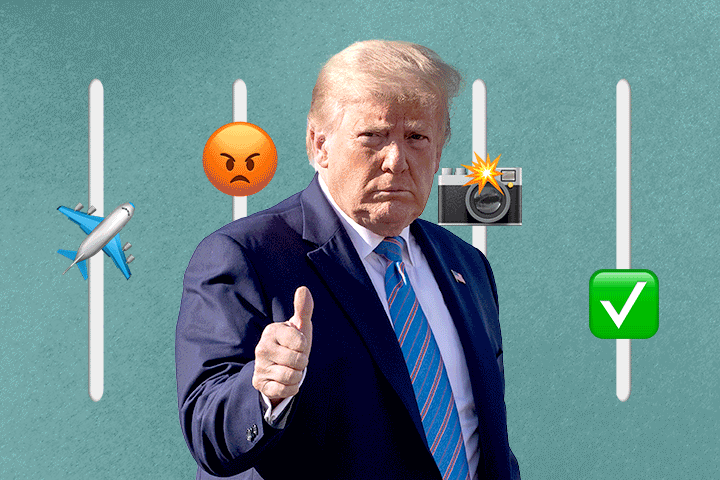Top election official races feature deniers of 2020 results

PHOENIX â An Arizona lawmaker endorsed by former President Trump who attended the Jan. 6, 2021, rally that preceded the violent assault on the U.S. Capitol and another lawmaker who also believes the 2020 presidential election results should be overturned are among four Republicans vying for the top elections post in the presidential battleground.
Itâs a trend, seen in several Republican primaries this year, that has led to mixed results for those who peddle conspiracy theories and promote the falsehood that widespread fraud led to Trumpâs defeat. Tuesdayâs primary elections feature similar candidates in Kansas and Washington state.
In Kansas, voters will choose between a challenger who questions the 2020 presidential results and the incumbent Republican who believes the election was secure in his state. Washington stateâs open primary also has a candidate who backs Trumpâs unsupported claims, although thatâs not the toughest challenge the Democratic incumbent faces.
So far this year, Republican primary voters have split on whether to put election skeptics on the November ballot.
In June, Nevada voters selected former state lawmaker Jim Marchant, who has been repeating the false claims that the 2020 election was stolen from Trump, to face the Democrat in an open race for secretary of state. But in Colorado, GOP voters rejected a local election clerk who has been appearing with Trump allies promoting conspiracies about voting machines and instead chose a Republican who vowed to keep politics out of elections.
And Georgia Secretary of State Brad Raffensperger, who rejected Trumpâs plea to âfindâ enough votes for him to win the state, easily survived a primary challenge to advance in that stateâs May primary.
Arizonaâs secretary of state race is the most eye-catching and consequential of Tuesdayâs primary battles, in part because of Republican state Rep. Mark Finchem.
The retired Michigan police officer and current Arizona House member was at the Capitol on Jan. 6 and contends Trump lost Arizona because of rampant fraud. He backed a controversial and much-criticized state Senate âauditâ of the 2020 election results in the stateâs most populous county and this year tried to get the Republican-controlled Legislature to notify Congress that Arizona wanted to decertify Joe Bidenâs election win.
Finchem also is suing in federal court with a leading GOP contender for Arizona governor to block the use of vote-counting machines in Arizona. The lawsuit contends they are potentially prone to hacking that can change votes; a judge is considering whether to throw out the case.
Finchemâs claims come despite the lack of valid evidence of any widespread fraud that would have changed the result in Arizona, where Biden beat Trump by over 10,000 votes. He maintains that âfictitious ballotsâ marred the results.
His primary competitors include another state House member, Shawnna Bolick, a Trump supporter who contends the 2020 election was deeply flawed. She said in a televised debate that she would not have certified the election had she been secretary of state, despite it being a requirement to do so absent a court order.
Kari Lake was a television news anchor in Phoenix for decades. Now, the Arizona gubernatorial candidate bashes the media as propagandists and uses her on-air savvy to rally Trump supporters.
âAnd I would have been breaking the law at that point and that would have been fine,â she said on the debate carried on Arizona PBS.
The other two Republican candidates are state Sen. Michelle Ugenti-Rita, who acknowledges Bidenâs victory and has made election reform a key focus during her 12 years in the Legislature, and Beau Lane, a businessman and political newcomer who has earned the endorsement of Republican Gov. Doug Ducey.
Ugenti-Rita said none of the other candidates has her understanding of election law and that she believes she has broad support across the state.
âThey immediately recognize my record and experience, and they feel assured that I can get the job done, and thatâs the message,â Ugenti-Rita said about voters. âThatâs what people want. Theyâre done with platitudes â it gets policy nowhere.â
Progressive groups see a secretary of state race, featuring Trumpâs election lies, as a way to energize voters of color and keep Arizona in Democratsâ hands.
Lane said his executive experience makes him the best choice for the job. He noted his long engagement in Republican politics, back to when as a young man he was a page at the 1980 Republican convention in which Ronald Reagan was nominated for president.
âAbove all, we need somebody who can be a fair dealer and help restore faith in elections,â he said.
Lane said other than a few hiccups and isolated cases of voter fraud, the 2020 election was well run, although he joined the other Republicans in criticizing Democratic Secretary of State Katie Hobbs, who is seeking her partyâs nomination for governor.
âWas there organized, rigged fraud that that changed the outcome of the election?â he asked. âI have seen no evidence of that.â
Two Democrats are seeking their partyâs nomination â former Maricopa County Recorder Adrian Fontes, who lost his seat in the 2020 election, and Arizona House Minority Leader Reginald Bolding. Both criticize Finchem and other Republicans who question the 2020 election results and say that a Finchem victory would be dangerous for democracy.
In Kansas, Secretary of State Scott Schwab also is facing a challenge from his right in the stateâs GOP primary.
Schwab is a former Kansas House member who has defended the use of ballot drop boxes, which Trump and other Republicans say are prone to misuse, even though there is no widespread evidence of that. He has dismissed baseless theories about fraud.
Schwabâs primary opponent is Mike Brown, a construction contractor and former county commissioner in Johnson County, the stateâs most populous and home to Kansas City-area suburbs.
Brown has made doubts about the security of Kansas elections central to his campaign. Heâs promised to ban ballot drop boxes and said he will use the secretary of stateâs office to pursue election fraud cases.
Former President Trump uses primary endorsements to seek revenge, push election fraud lies and shape the Republican Party. How are his candidates faring?
Washington stateâs âtop twoâ primary features Democratic Secretary of State Steve Hobbs, who was appointed by Gov. Jay Inslee last November and hopes to retain his seat for the remaining two years of former Republican Secretary of State Kim Wymanâs four-year term. Heâs the first Democrat to hold the office since 1965, taking Wymanâs seat after she left for an election security job in the Biden administration.
Hobbs faces several Republican and unaffiliated challengers, including Tamborine Borrelli, an âAmerica Firstâ candidate who was fined by the state Supreme Court last month for making legally meritless claims alleging widespread voter fraud.
Under Washingtonâs primary system, the top two vote-getters advance to the general election in November, regardless of party. Results will likely take days to tally because itâs an all-mail election.
Associated Press writers John Hanna in Topeka, Kan., and Rachel La Corte in Olympia, Wash., contributed to this report.
More to Read
Get the L.A. Times Politics newsletter
Deeply reported insights into legislation, politics and policy from Sacramento, Washington and beyond. In your inbox three times per week.
You may occasionally receive promotional content from the Los Angeles Times.













